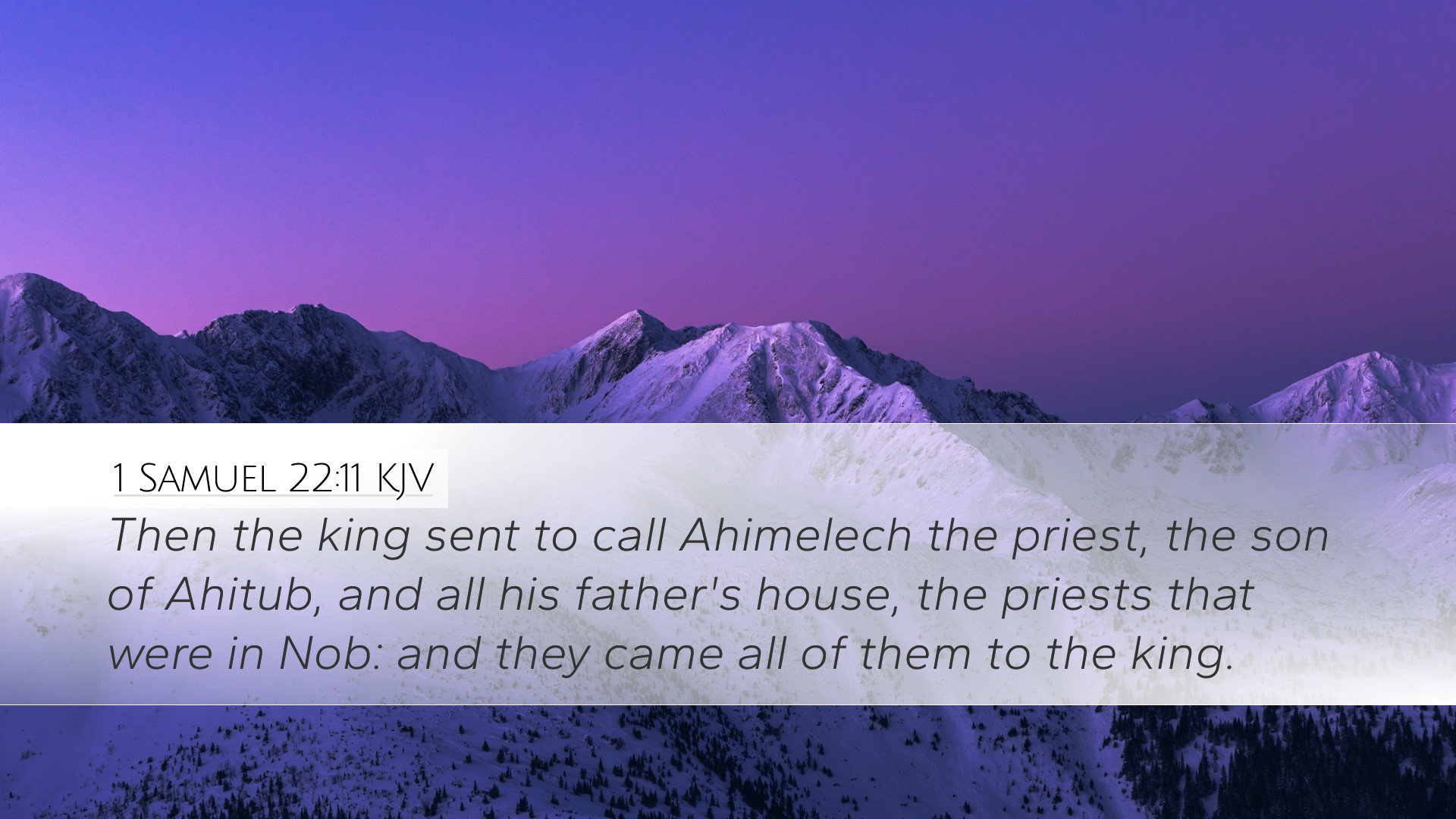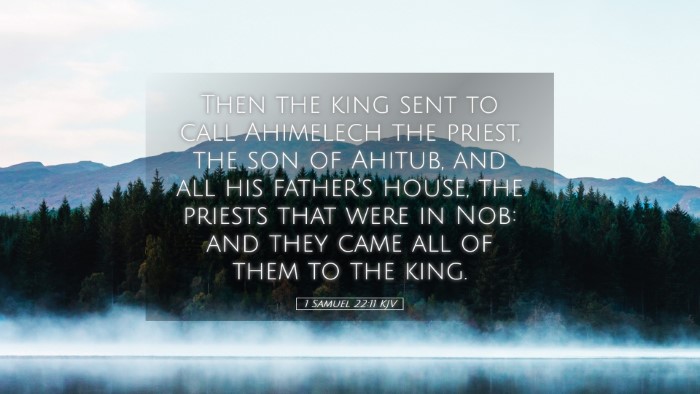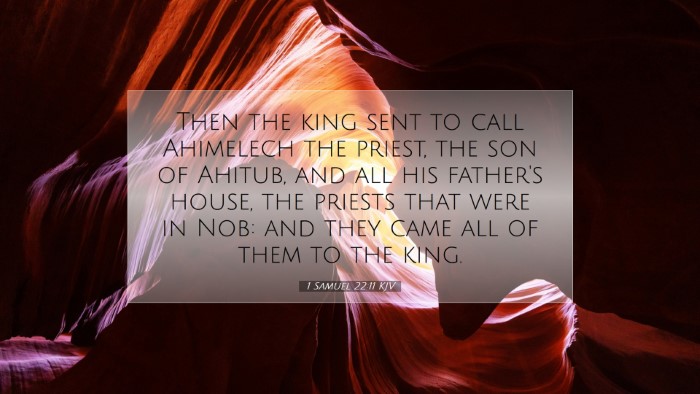Commentary on 1 Samuel 22:11
1 Samuel 22:11 states, "Then the king sent to summon Ahimelech the priest, the son of Ahitub, and all his father's house, the priests who were at Nob. And all of them came to the king." This passage serves as a pivotal moment in the narrative of David's rise to kingship and Saul's decline. Its significance can be understood through a combination of historical context, theological insight, and literary analysis.
Contextual Analysis
The events leading to 1 Samuel 22 unfold against the backdrop of Saul’s growing paranoia and jealousy towards David, who was increasingly popular among the Israelites. David had recently fled from Saul, seeking refuge. His visit to Nob, where the tabernacle was located, illustrates his desperate situation.
This verse marks a crucial turning point; Saul’s call for Ahimelech and the priests indicates a shift from Saul's initial hostility towards David to a direct assault on those who aided him. The act of summoning Ahimelech reflects Saul’s attempts to consolidate power and root out perceived threats.
Theological Implications
Matthew Henry emphasizes the moral dimensions of this text. He notes that Saul's actions represent a profound violation of justice and mercy, reflecting how power can corrupt leaders. Saul’s inquiry illustrates a tragic irony: he seeks to eradicate those who serve God and uphold true worship. This episode also reveals the lengths to which Saul will go to maintain his position, serving as a warning to leaders about the dangers of unchecked ambition and jealousy.
Albert Barnes highlights the theme of divine providence. Despite Saul's malicious intent, the narrative illustrates that God oversees the unfolding of events in Israel’s history. Through Ahimelech’s response to Saul, the text foreshadows the consequences of Saul’s opposition to God’s chosen servant, David. It serves to remind readers that while human actions may seem to prevail, God’s plan will ultimately prevail.
Character Study: Ahimelech
Ahimelech’s character draws interest from theologians and scholars alike. Adam Clarke posits that Ahimelech shows a mix of compassion and innocence. He serves as a priest who, recognizing David’s plight, responds with hospitality by providing him with the sacred bread reserved for the priests. This act demonstrates Ahimelech’s understanding of necessity over ritual, highlighting a principle of mercy amidst law.
- Ahimelech’s Innocence: He does not perceive the danger in assisting David, indicating his naiveté regarding Saul’s twisted intentions.
- Moral Courage: By aiding David, Ahimelech implicitly shows a preference for God’s anointed over Saul, presenting a complex moral landscape.
Saul’s Leadership Crisis
Saul's summoning of Ahimelech and the priests is symptomatic of his crumbling leadership. The way he reacts to David’s flight paints a picture of a king under siege not only from external forces but also from his own internal struggles. Matthew Henry notes that Saul’s inquiry of the priests represents a desperate and misguided attempt to regain control.
In this passage, we see Saul engaged in a witch hunt against anyone perceived as an ally of David. His search for certainty leads to disorder and ultimately violence, contrasting the peaceful reign expected of a king. This insight serves as a reminder for contemporary leaders to root their authority in integrity and righteousness, rather than fear and suspicion.
Literary Analysis
The narrative technique employed here is significant. The summoning of Ahimelech serves as a catalyst for further developments in the story. Not only does it highlight Saul’s authority, but it also introduces the theme of conflict between Saul and God’s chosen king, David. The unfolding drama serves the theological narrative, where the anointed shepherd must face the wrath of a rejected king.
Furthermore, the collective response of the priests accompanying Ahimelech signifies the communal aspect of faith-based leadership in ancient Israel. Scholars like Albert Barnes note that it was customary for priests to stand together, reflecting their collective role in Israel’s spiritual life. This unity among the priests emphasizes the seriousness of Saul’s actions, which ultimately leads to tragic consequences.
Conclusion
In summary, 1 Samuel 22:11 poses critical questions about authority, morality, and the consequences of disobedience to God. The combined insights from various public domain commentaries reflect on the leadership of Saul and the innocent actions of Ahimelech, representing broader themes inherent in the biblical narrative.
This verse speaks profoundly to pastors, students, theologians, and Bible scholars, urging reflection on ethical leadership, the importance of standing for righteousness, and the hope that divine providence brings, even in tumultuous times.


